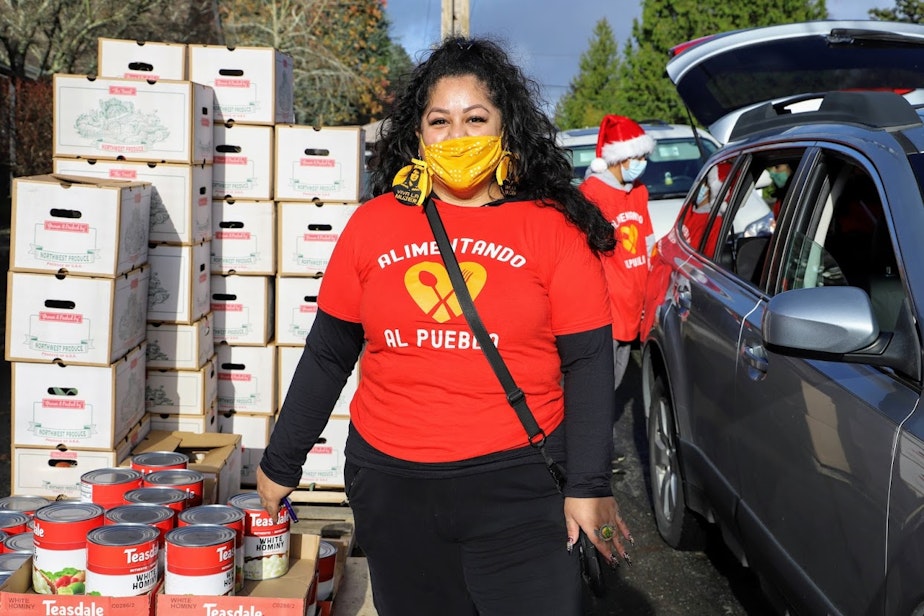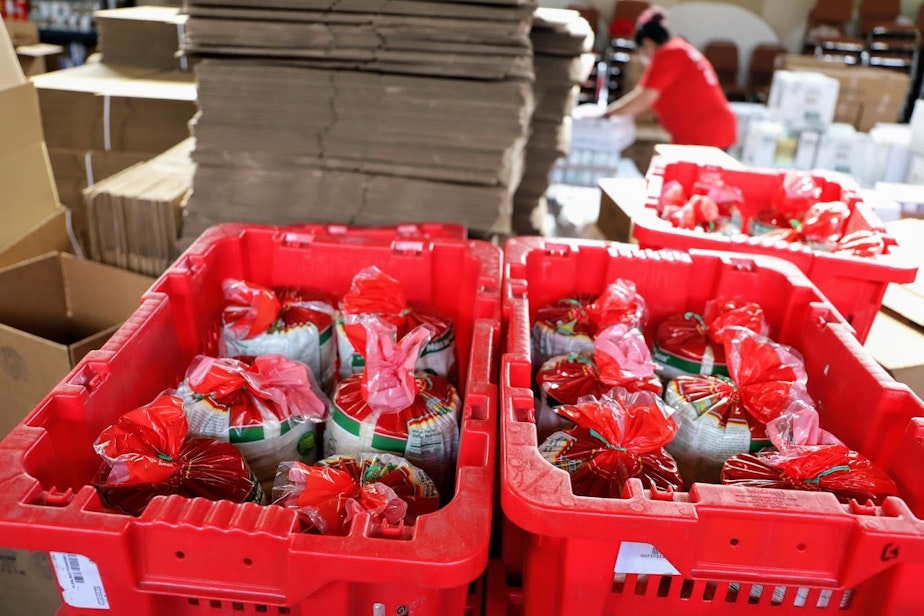This Burien food pantry provides more than familiar staples to the Latinx community

Growing up, Roxana Pardo Garcia remembers feeling shame whenever her mother sent her to the food bank when times were difficult. Today, as an adult, Garcia organizes a food pantry serving King County’s Latinx community, one that offers a more positive experience during these hard times.
Inside Lake Burien Presbyterian Church, masked staff and volunteers are busy packing up food boxes that will soon go out. This is Alimentado el Pueblo, a community pantry.
Cofounder Roxana Pardo Garcia says they’re putting together two kinds of boxes.
“These are the Mexican boxes,” she said. “And you know they’re Mexican because they have the tortillas and they also have chiles en vinagre.”
Garcia says these chiles are used as salsa bases. The second type, Central American or Caribbean boxes have condensed milk and fresh yucca and plantains. Both types contain rice and beans.
Garcia started this pantry this summer after a conversation with her aunt about going to food banks.
Sponsored
“She’s like, every time I go they don’t give me things that I can cook with.”
Hearing that, she says, reminded her of the times when she went to food banks growing up.
“A lot of food that we used to get was on the brink of expiration or already expired and I was like, huh, why don’t we do a Latino food bank?”
It makes a lot of sense, she says to give people food they’re familiar with. It also helps reduce waste. She spent the next few weeks calling around and coordinating with different groups to help make it happen. When they started distributing, they’d ask people what kind of box they want.
“They were like, huh? They were caught off guard by that question,” Pardo said. “And I remember like having to tell them, 'where’s your family from?' They’re like, 'Oh, Mexico.' 'OK, I’ll give you a Mexican box.' People were really shocked at that question.”
Sponsored

The pantry serves culturally-relevant food to people living in Burien, Des Moines, Normandy Park, SeaTac, and White Center. And it couldn’t have come at a more crucial time.
“During the pandemic, the Latinx community was three times more food insecure than white folks across our state,” said Katie Rains, who serves on Governor Inslee’s Food Security Coordination Team.
Rains notes that many are afraid to seek help from government programs for fear it could affect their immigration status in the future. Having trusted programs within their communities where documentation is not required, is important.
“So that allows folks to access food without being fearful of their name being on record.”
Sponsored
She’s optimistic that the Biden administration will give states more autonomy to do what’s best for residents in the coming months.

Outside the church, people have waited more than hour in their cars. A steel pan band plays, creating a festive mood during the wait.
Lorgia Gomez is third in line.
“I’m a school bus driver,” Gomez said. “So no school, no work. And this helps me provide for my family.”
Sponsored
Gomez says getting food boxes here means so much more because they contain familiar staples.
“It’s actually stuff I eat and use.”
Soon, the line starts to move. Volunteers load up the trunks. There’s a special treat for the holiday—pan dulce or sweet bread from a local baker. Pardo Garcia says their goal is much more than just providing familiar foods to the community. While this is a hard time, she wants to create new memories associated with the pandemic.
“We can’t be with each other right now,” she said. “And this is the way we can. So why not make it a celebration? Why not make it something that is lively, vibrant, and colorful and full of laughter and joy and pan dulce!”
When Garcia started the pantry this summer, they gave out 75 boxes. Now it’s 200 boxes each week. Next Monday will be its last distribution for the year. But they’re already trying to figure out plans for next year.




